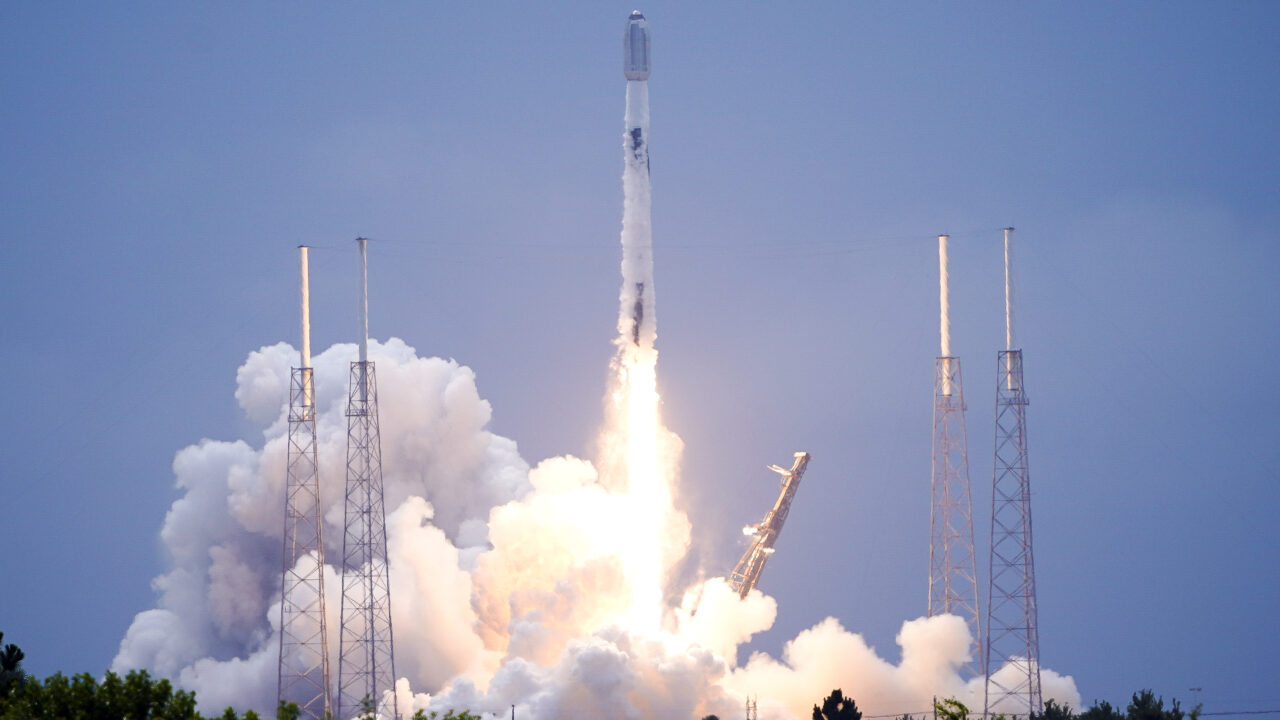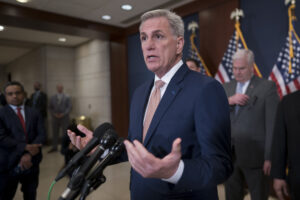Despoiling the Final Frontier
A flood of new satellites could lead to the destruction of the ozone layer. A SpaceX Falcon 9 rocket, with a payload a of Starlink satellites for a high-speed low earth orbit internet constellation, lifts off. Photo: John Raoux / AP.
A SpaceX Falcon 9 rocket, with a payload a of Starlink satellites for a high-speed low earth orbit internet constellation, lifts off. Photo: John Raoux / AP.
Here we go again. Satellite companies that plan to put tens of thousands of satellites into orbit to create space-based internet and cellphone networks are about to reach the final frontier for human degradation of the environment, outer space. And, they are doing it in ways that threaten the radiation protection of the ozone layer.
The so-called low Earth orbit satellites the companies are launching are designed to last for around five years and then fall back to Earth, disintegrating in the atmosphere as they fall. What they leave behind are materials that are likely to lead to the destruction of the ozone layer. With thousands of satellites potentially falling to Earth each year, the extent of the damage could be major.
We’ve seen this movie before. Without the curiosity of a lone scientist and his assistant in the early 1970s who asked what happens to highly persist chlorofluorocarbons (CFCs) once they are released into the air from refrigerator coils and spray cans, we humans might have lived (and died) through the destruction of the ozone layer without having the knowledge to stop it. That layer high up in the stratosphere protects all living things from the Sun’s ultraviolet radiation.
The work of F. Sherwood Rowland and his assistant, Mario Molina, was central in bringing about the Montreal Protocol in 1987 which led to a worldwide phaseout of the production of ozone depleting substances. Without the protocol, an ozone hole—then limited to the Antarctic—may have spread across the planet threatening all of humanity and all living thing—life which, as it turns out, evolved adapted to the ozone layer’s protection from ultraviolet radiation.
CFCs, which are synthetic compounds, began to be widely used in the 1920s. So, it took more than 50 years before their danger to our health and the environment became known. Today, we are at the beginning of a colossal increase the number of satellites orbiting the Earth from about 5,000 to perhaps hundreds of thousands. And, we know in advance that this may end up destroying the ozone layer if we don’t do something. But will we?
The simple truth is that the FCC knows nothing about spaceflight and next to nothing about regulating anything for safety or environmental protection.
It’s worth understanding the reasons these satellites are going up. Why, after all, do we need a new space-based network for internet and cellphone communications when we already have a terrestrial one? The companies launching the satellites will tell you that they want to reach underserved people in rural areas who can’t access high-speed telecommunications services. A more plausible explanation is that it costs a lot of money to build a terrestrial network, and it’s risky to do so alongside other competing networks that already exist. In some cases it would not be permitted because the government owns and runs the internet and wireless telecommunications network.
In addition, for terrestrial networks a company must deal with national, state and local governments around the world and with their rules, permit applications, laws and fees. The cheap, easy way to build a network then is to go to the FCC—which acts as if it has jurisdiction over all of outer space—and get mass approvals to launch thousands of inexpensive satellites. As a bonus, the FCC won’t bother you with burdensome environmental reviews.
The simple truth is that the FCC knows nothing about spaceflight and next to nothing about regulating anything for safety or environmental protection. It is a political commission created for a political purpose: to allocate scarce spectrum for the public good to people and organizations who want to use it.
As for the satellite companies, their protestations that they have the interests of the poor and the neglected in mind will soon be revealed as mere public relations. The vast bulk of internet and telecommunications users live in urban areas. Servicing them will be much cheaper than servicing rural inhabitants who are spread out. It’s important to understand that satellite-based systems currently require ground-based relay stations to operate. That costs money, and it’s more cost-effective to configure those stations for serving dense, urban populations. The same goes for the deployment of satellites across the sky. The more people served by one satellite, the cheaper the system will be to construct and operate.
In essence, the satellite companies are just trying to carve out a small portion of a highly lucrative market on the cheap. This is no charity project for the dispossessed.
How much would you bet that the promises of the satellite internet companies to cover the whole Earth including poor countries and rural areas will go unfulfilled?
We’ve seen what happened to money many of us Americans paid in special fees authorized by the government and given to internet companies to bring fiber-optic to rural and underserved areas. The money was re-appropriated for the expansion of the industry’s wireless network for a simple reason: wired communications prices are regulated and wireless communications prices are not. The industry is just another Willie Sutton. When asked why he robbed banks, Sutton said, “Because that’s where the money is.”
As of 2017—I could find no market intelligence for free after that—the United States ranked 39th in the world for fiber-optic deployment, far behind Singapore and South Korea that were third and fourth, respectively, and behind such technology giants as Uruguay (9th), Vietnam (21st), Bulgaria (23rd) and Kazakhstan (35th). Universal fiber-optic would be a far better and more secure system for all of us.
How much would you bet that the promises of the satellite internet companies to cover the whole Earth including poor countries and rural areas will go unfulfilled? Remind yourself whenever you hear such promises that those companies will almost certainly focus on the markets that are most lucrative “because that’s where the money is.”
Your support matters…Independent journalism is under threat and overshadowed by heavily funded mainstream media.
You can help level the playing field. Become a member.
Your tax-deductible contribution keeps us digging beneath the headlines to give you thought-provoking, investigative reporting and analysis that unearths what's really happening- without compromise.
Give today to support our courageous, independent journalists.






You need to be a supporter to comment.
There are currently no responses to this article.
Be the first to respond.